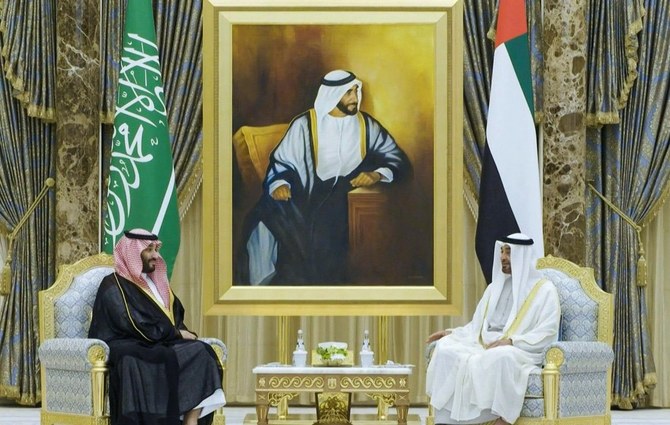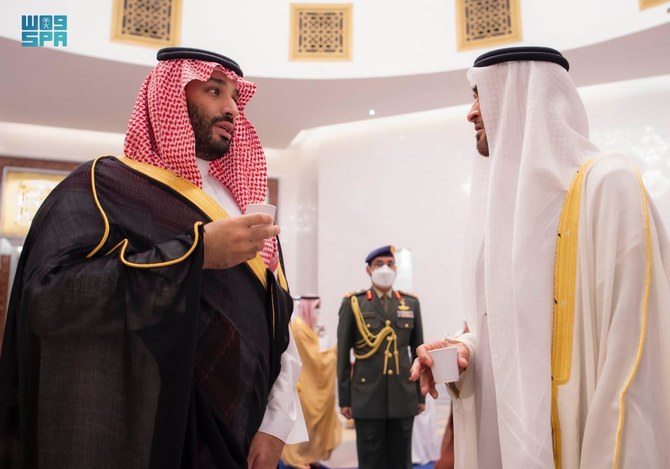RIYADH: Saudi Arabia and the UAE, two Gulf Arab countries bound by strong familial, religious, cultural and commercial ties, have enjoyed a fraternal relationship for most of their modern existence.
The depth of the bilateral relationship, however, owes much to regular official exchanges, reciprocal visits by royals, and high-level summits that have taken place over the years.
The continuity of that decades-old process is epitomized by Saudi Crown Prince Mohammed bin Salman’s visit to Abu Dhabi, the second stop in a tour of Gulf states ahead of the annual Gulf Cooperation Council summit this month.
“The visit by His Royal Highness Prince Mohammed bin Salman comes as part of enduring efforts to deepen strategic cooperation and coordination between our two countries on local, regional, and international issues, reflecting the shared visions and policies of our two countries’ leaderships,” Khalifa Shaheen Al-Marar, UAE minister of state, told Arab News.
I am pleased to welcome my brother, Mohammed bin Salman, to the UAE. Working together, we continue to build upon the deep ties of friendship and cooperation that exist between the UAE and Saudi Arabia while contributing to the strength and stability of the region. pic.twitter.com/Awo03t2Biv
— محمد بن زايد (@MohamedBinZayed) December 7, 2021
Under the leadership of King Salman, Custodian of the Two Holy Mosques, and President Sheikh Khalifa bin Zayed Al-Nahyan, Saudi-UAE bilateral ties have grown into a comprehensive strategic partnership.
“The UAE and Saudi Arabia maintain a strategic partnership based on the same objectives and vision for regional prosperity, security and stability,” Al-Marar said.
“The UAE believes that the developmental journey of the Kingdom of Saudi Arabia, led by the Custodian of the Two Holy Mosques King Salman and His Royal Highness Crown Prince Mohammed bin Salman, is remarkable, and contributes to the overall progress and growth of the region.”
When Crown Prince Mohammed bin Salman and Abu Dhabi’s Crown Prince Mohammed bin Zayed last met in Riyadh in July this year, they explored avenues for enhancing Saudi-UAE ties and strategic cooperation.
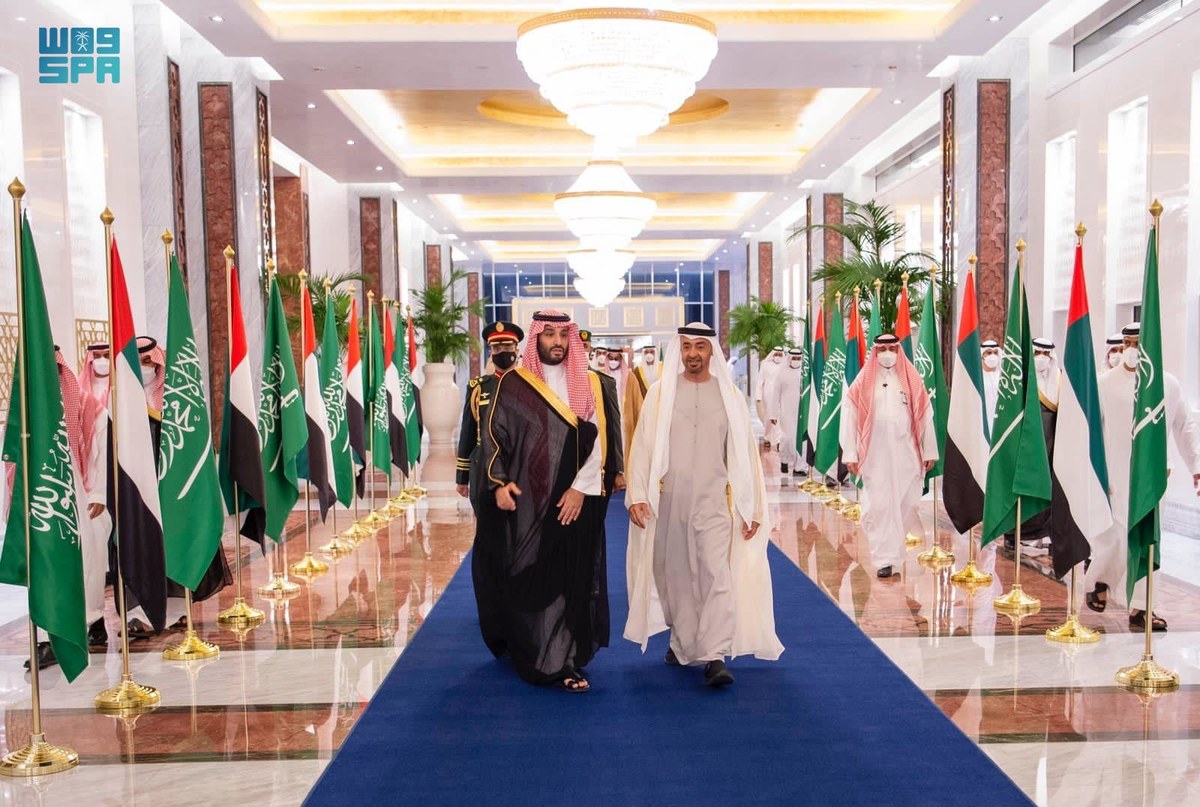
Each generation of leaders has built on the foundation laid under the leadership of Sheikh Zayed Al-Nahyan, founding father of the UAE, and King Faisal bin Abdul Aziz, his Saudi counterpart. (SPA)
Each generation of leaders has built on the foundation laid under the leadership of Sheikh Zayed Al-Nahyan, founding father of the UAE, and King Faisal bin Abdul Aziz, his Saudi counterpart, when bilateral cooperation began to expand.
During one of his Umrah trips to the Kingdom, Sheikh Zayed described the relationship between the two neighbors this way: “The UAE is with Saudi Arabia through its heart and soul, and we believe that we have one destiny, and that we have to act as one and stand by each other.”
In 1981, on the strength of their centuries-old ties, and common economic and strategic visions, the UAE, Saudi Arabia, Oman, Bahrain, Kuwait and Qatar created the Gulf Cooperation Council.
The creation of the GCC “was not a product of the moment but an institutional embodiment of a historical, social and cultural reality. Deep religious and cultural ties link the six states, and strong kin relations prevail among their citizens,” according to the official website.
In 2014, Saudi Arabia and the UAE, the two leading members of the GCC, formed a joint committee to achieve the strategic visions of the two countries’ leaders, to overcome challenges and strengthen relations.
This led to the formation of the Saudi-Emirati Coordination Council to promote religious, historical, social and cultural ties and to intensify bilateral cooperation.
A year later, the two countries organized a high-level meeting, which was attended by over 150 officials from both countries to discuss areas of mutual interest and to create a general framework for the bilateral council, under three main themes: economy, human development and political and military cooperation.
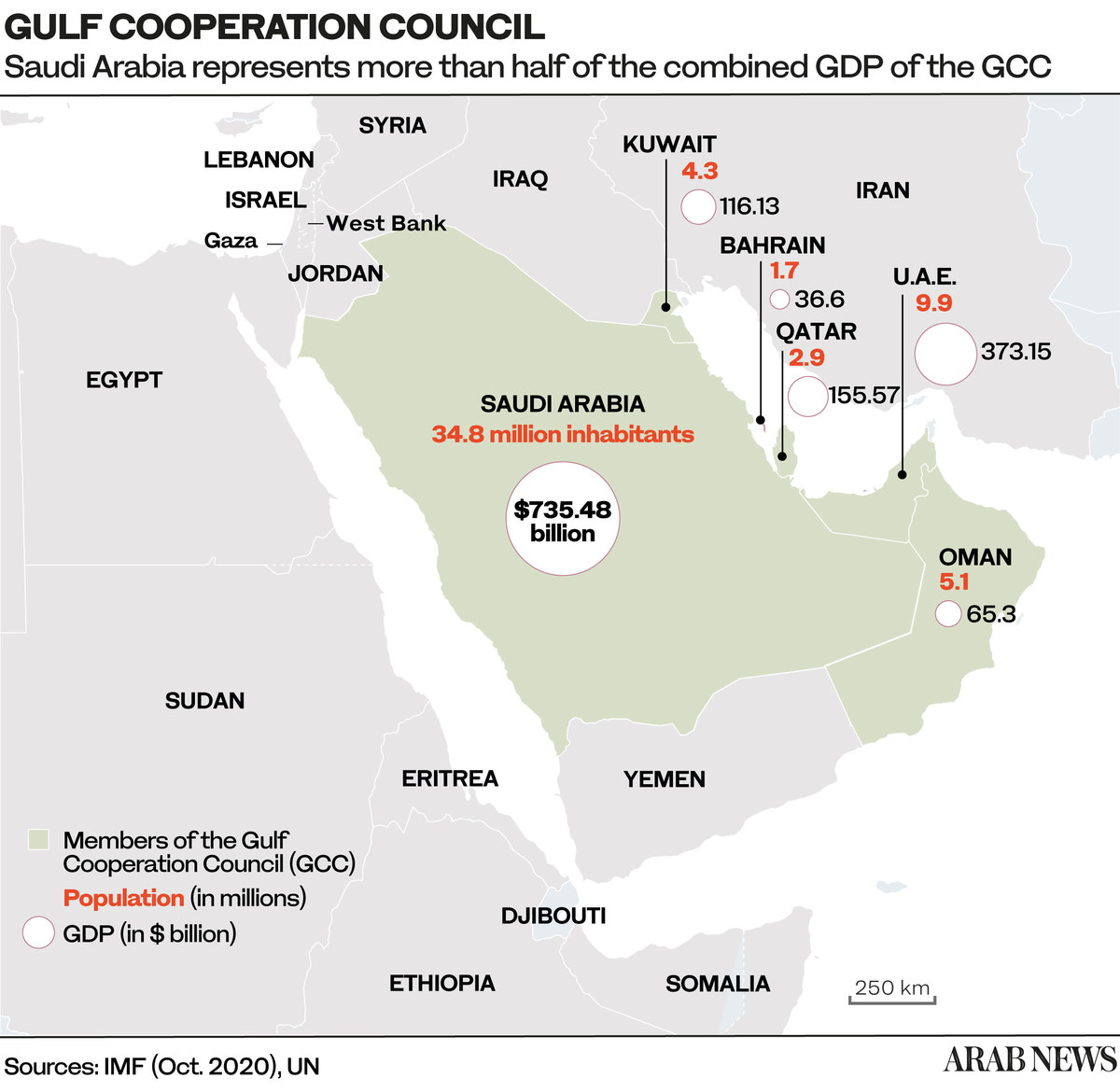
A second meeting was held in Riyadh during the same year, with the objective of building on the earlier resolutions and launching initiatives to develop coordinated policies.
In 2018, Saudi Arabia and the UAE developed a unified vision that aimed to boost their global stature through the implementation of 44 joint projects. The Alaazm (Determination) Strategy was developed over 12 months by 350 officials from both countries, involving 139 governmental, sovereign and military bodies.
By focusing on three main areas — the economy; humanity and knowledge; and politics, security and the military — it sought to promote security and economic ties and to improve the living standards of citizens.
On Behalf of President HH Sheikh Khalifa bin Zayed, HH Sheikh Mohamed bin Zayed Presents ‘Order of Zayed’ to Mohammed bin Salman#UAE #SaudiArabia #معا_أبدا#الإمارات_السعودية@MoFAICUAE@UAEEmbassyKSA@KSAMOFA pic.twitter.com/YIdscBYyt2
— UAE Forsan (@UAE_Forsan) December 7, 2021
A timescale of five years was set to implement the strategy’s projects, which aimed to build an integrated model that would support joint GCC cooperation and contribute to protecting their interests, in addition to creating new opportunities.
On the sidelines of the coordination council’s first meeting, 20 memorandums of understanding were signed to implement projects from the Alaazm strategy.
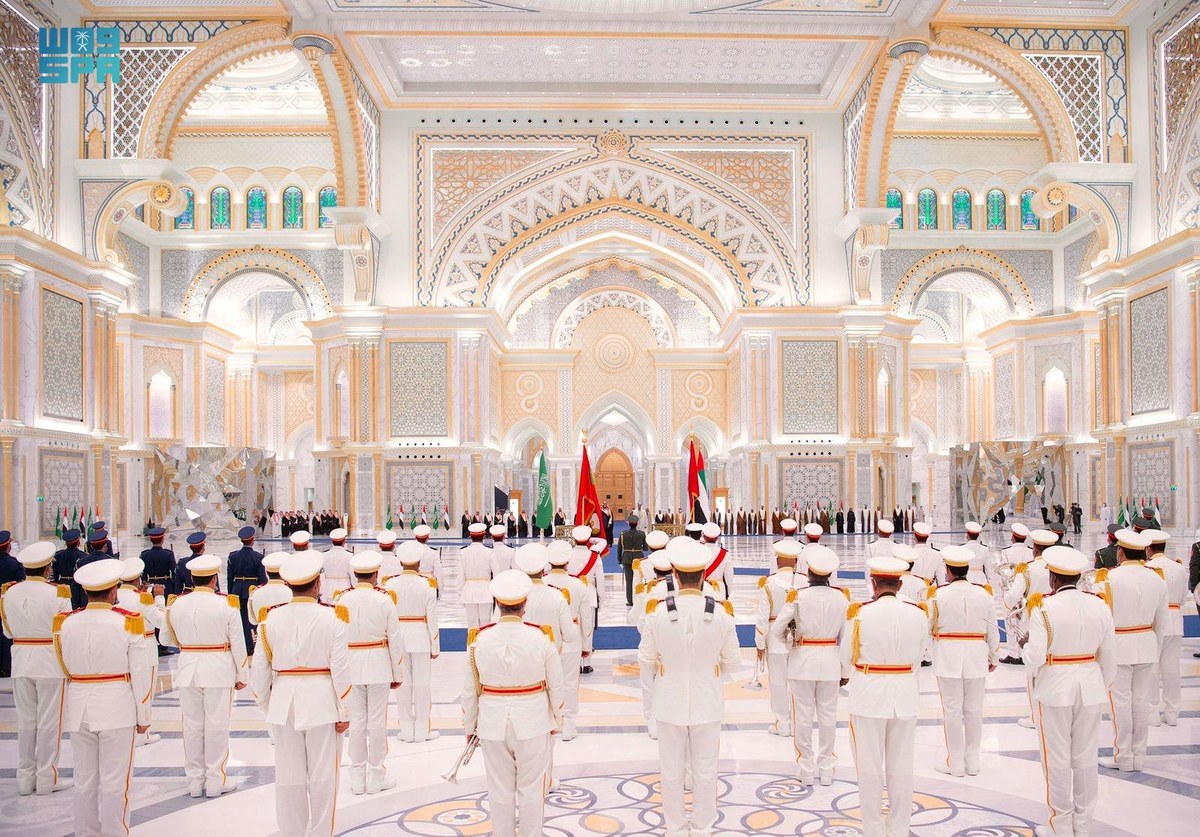
In 2018, Saudi Arabia and the UAE developed a unified vision that aimed to boost their global stature through the implementation of 44 joint projects. (SPA)
Middle East analysists believe that in recent years, close political and strategic cooperation between Saudi Arabia and the UAE has helped preserve the prosperity of the Gulf countries amid a strife-torn Middle East.
“Politically, the UAE and Saudi Arabia have upheld common objectives to ensure that the region’s peoples can achieve their aspirations for security, stability, peace and development,” Al-Marar told Arab News.
“In Yemen, in particular, the UAE remains steadfast in its calls for a political solution to end the conflict and maintains full confidence in Saudi Arabia’s leadership of this file.”
Economic cooperation between the two countries is an achievement in its own right. Saudi Arabia is the leading Arab trade partner of the UAE and its third-largest international trading partner, accounting for 7 percent of the UAE’s international non-oil trade.
The two countries have the two largest Arab economies and are among the top 10 exporters in the world, with a total export value of nearly $750 billion in 2018.
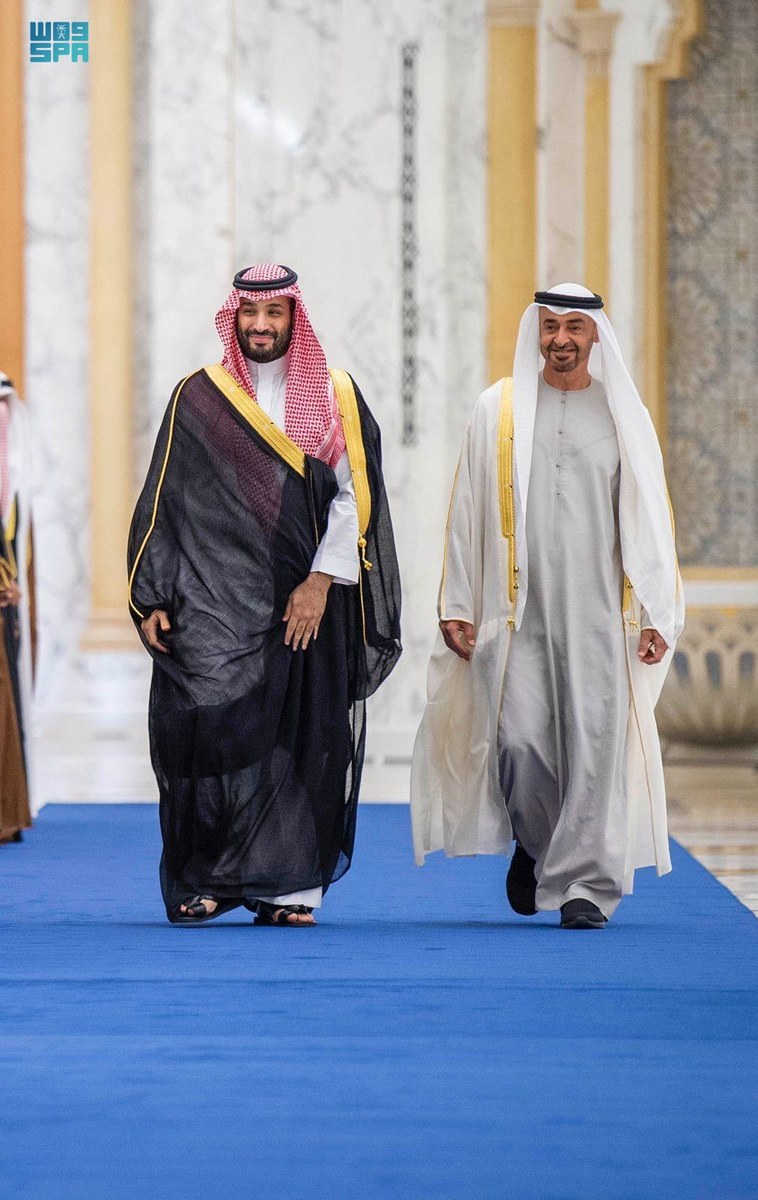
Crown Prince Mohammed bin Salman with Abu Dhabi’s Crown Prince Mohammed bin Zayed Al-Nahyan during his latest visit. (SPA)
“Similarities in economic development between the UAE and Saudi Arabia have united our two nations and allowed us to stimulate prosperity. Having already convened two meetings of the Saudi-UAE Coordination Council in recent years, our two countries are keen to develop new partnerships in all sectors, including tourism, infrastructure, transport, shipping, and logistics,” Al-Marar said.
He added: “Bilateral discussions continue to address ongoing efforts to develop the national economy in non-oil sectors, as well as ways to improve the business climate and empower the private sector in our countries.”
Saudi-UAE cooperation has been no less evident in the fields of energy and environment. Last month, the two countries, core members of OPEC, both highlighted their investments in renewable energy and decarbonization initiatives, but also defended the oil industry at the UN Climate Change Conference for its role in ensuring energy security and economic development.
The energy ministers of the two countries jointly contended that the focus of COP26 should be to contain emissions, which would allow oil and gas to continue to be used and smooth the energy transition, especially for poorer nations that cannot afford renewables, rather than seek to pivot the world away from fossil fuels.
“The UAE and Saudi Arabia, as the largest economies in the Gulf, recognize that we must play a leading role in adopting clean energy technologies and promoting a sustainable future for generations to come,” Almarar said.
“Through economic diversification and green innovation, our two countries are determined to promote climate resilience and conservation, particularly in developing countries.”


